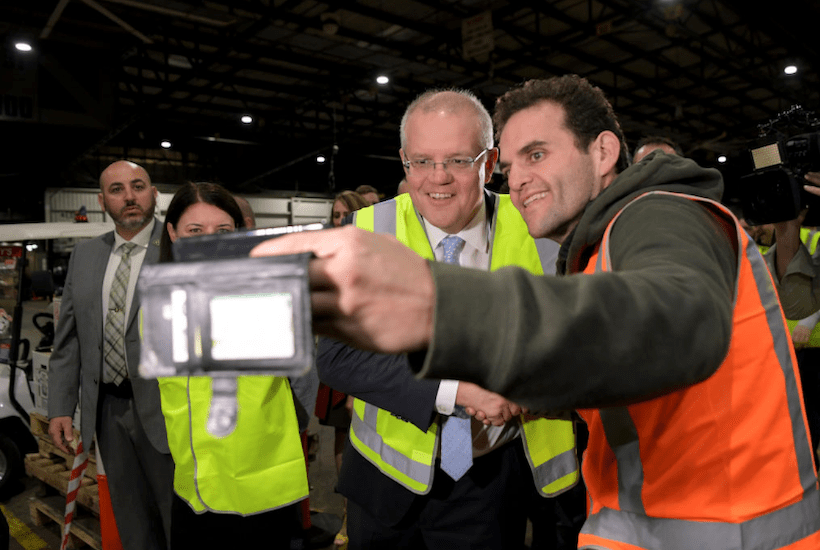The 2007 federal election was held in the early days of social media. Many a time when John Howard visited a shopping centre or other public place in support of local candidates, he would walk to a voter, hold out his hand and introduce himself, followed by a throng of cameras and whoever the local aspirant was.
The following dialogue inevitably happened:
“Can I get a photo, prime minister?”
“Sure”.
Howard knew that the voter would forward the photo on to friends, colleagues and family. In a marginal seat, dozens of votes could be the difference. The photo was worth a few direct mail pieces to those same voters. The photo would, of course, be taken by someone else. Selfies weren’t yet invented.
Today, the resignation caused by Mike Kelly in Eden-Monaro and the subsequent campaign won’t include any shopping centre photos with voters. Handshakes are out too.
There will be shopping though. Lots of food shopping. It’s something the candidates can do legitimately and usually make for a worthwhile photo. Scomo and Albo grabbing a coffee two metres apart from their respective candidates.
However, due to social distancing, the campaigning will be overly limited and will likely lack the same atmosphere that normally comes with a high profile by-election. This will be true both on the ground and from our television screens.
Coronavirus has restricted just about every facet of Australian activities but it’s important that this by-election not be run half-baked. If it is to be run in 2020, it needs to be as accessible and free for everyone involved, from the first voter to the last candidate.
There are two components to any election conducted during a pandemic: The election itself and the campaign itself. Contrary to popular belief the two don’t overlap.
I would be surprised if the major parties aren’t already negotiating parameters around what is on and off-limits. If the loser claims the election wasn’t fair because there was no freedom of movement, would that be grounds to contest the result?
What if a candidate contracts the virus during the formal campaign? What if a candidate is tested mid-point and has to self-isolate?
I’ve knocked on about 15,000 doors in my day. The voter already doesn’t really want to talk to you. At the moment, the voter would be right to not open the door at all for a variety of obvious reasons.
A question arises. Is campaigning working? As in part of a candidate’s employment? As following that, is campaigning essential?
When you take out doorknocking, campaign rallies, listening posts and shopping centres, you’re left with mailouts, phone calling and social media.
That’s the major parties though.
Throw in the element of the minor parties and independent candidates not being able to campaign as freely as possible and there may be an argument that communicating to the voter
The parties will no doubt be hoping for the public gathering restrictions to be lifted by the time the polls open.
Then there’s the actual election itself. That’s the part where the ballots are cast and dropped in the box, then the votes are counted, not the sausage sizzles and how to vote card gauntlet outside.
The last elections held in Australia were the Queensland local government elections of March 2020.
I would hope that some of the processes carried out there such as the significant changes in scrutineering and how to vote card distribution were not repeated in the Eden-Monaro by-election.
In those elections, restrictions were placed by the Electoral Commission so that scrutineers could take part at the beginning and end of counting only. The “standing over the shoulder” technique (ensuring every ballot goes to the right candidate), could not therefore take place.
Making sure the votes are counted correctly is a fundamental component of the election process. Virtual or digital methods of scrutineering at the very least must make part of the solution in Eden-Monaro. Unlike in the Queensland March elections, there is more time to plan for this for the upcoming by-election.
Another easier solution would be to hold the election a month or two later, from July onwards. In this scenario, early voting would still begin weeks before election day
The date can be announced before the writs are actually issued
There is also nothing to stop the by-election being held while parliament is sitting or even held later in 2020.
The government has a strong chance of winning the seat notwithstanding by-election swings often go against the incumbent government.
It has won marks for its handling of the crisis and Scott Morrison is being seen in a very positive light. However, record approval ratings of over 75 per cent did not save Churchill losing an election a few weeks after winning the war.
More important than which candidate wins will be the overarching fairness of the whole undertaking. In such a marginal seat, the counting will be as important as the campaign.
Let’s hope the returning officer gets it right before the result is returned.
Theo Zographos is a former Liberal Party candidate and strategist.
Got something to add? Join the discussion and comment below.
Got something to add? Join the discussion and comment below.
Get 10 issues for just $10
Subscribe to The Spectator Australia today for the next 10 magazine issues, plus full online access, for just $10.


























Comments
Don't miss out
Join the conversation with other Spectator Australia readers. Subscribe to leave a comment.
SUBSCRIBEAlready a subscriber? Log in